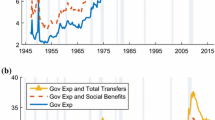Abstract
This paper studies the influence of consumption externalities in the Ramsey model. In contrast to the recent literature, a quite general specification of preferences is used and the concept of the effective intertemporal elasticity of substitution is introduced. We give conditions for the observational equivalence between economies with consumption externalities and externality-free economies. An additional key result is that there exist several types of instantaneous utility functions in which the decentralized solution coincides with the socially planned one in spite of the presence of consumption externalities. The conditions for optimal taxation are also derived.
Similar content being viewed by others
References
Barro, R. J., and Sala-i-Martin, X. (1995):Economic Growth. New York: McGraw-Hill (Advanced Series in Economics).
Corneo, G., and Jeanne, O. (1997): “On Relative Wealth Effects and the Optimality of Growth”.Economics Letters 54: 87–92.
Futagami, K., and Shibata, A. (1998): “Keeping One Step Ahead of the Joneses: Status, the Distribution of Wealth, and Long Run Growth”.Journal of Economic Behavior and Organization 36: 93–111.
Gali, J. (1994): “Keeping Up with the Joneses: Consumption Externalities, Portfolio Choice, and Asset Prices”.Journal of Money, Credit, and Banking 26: 1–8.
Harbaugh, R. (1996): “Falling Behind the Joneses: Relative Consumption and the Growth-Savings Paradox”.Economics Letters 53: 297–304.
Hof, F. X. (1999a): “Consumption Externalities, Economic Growth, and Optimal Taxation: a General Approach” Working Paper 99/01, Institute of Economics, University of Technology, Vienna.
— (1999b): “Relative Consumption and Endogenous Labor Supply in the Ramsey Model: Do Status-Conscious People Work Too Much?” Working Paper 99/02, Institute of Economics, University of Technology, Vienna.
Rauscher, M. (1997a): “Protestant Ethic, Status Seeking, and Economic Growth”. Discussion Paper, University of Rostock, Germany.
— (1997b): “Conspicuous Consumption, Economic Growth, and Taxation”Journal of Economics/Zeitschrift für Nationalökonomie 66: 35–42.
Author information
Authors and Affiliations
Rights and permissions
About this article
Cite this article
Fisher, W.H., Hof, F.X. Relative consumption, economic growth, and taxation. Journal of Economics Zeitschrift für Nationalökonomie 72, 241–262 (2000). https://doi.org/10.1007/BF01231266
Received:
Revised:
Issue Date:
DOI: https://doi.org/10.1007/BF01231266




